

Dan Brown. The Da Vinci Code. The novel is part of the exploration of alternative religious history, the central plot point of which is that the Merovingian kings of France were descended from the bloodline of Jesus Christ and Mary Magdalene, ideas derived from Clive Prince's The Templar Revelation (1997) and books by Margaret Starbird.
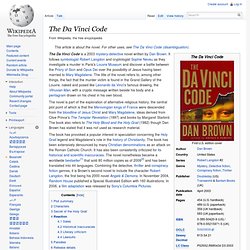
The book also refers to The Holy Blood and the Holy Grail (1982) though Dan Brown has stated that it was not used as research material. Plot summary[edit] A police cryptographer, Sophie Neveu secretly explains to Langdon she is Saunière's estranged granddaughter, and that Fache thinks Langdon is the murderer, because of the note her grandfather left saying to "find Robert Langdon," which she says Fache had erased prior to Langdon's arrival. Sophie is troubled by memories of her grandfather's involvement in a secret pagan group. Langdon and Neveu take the keystone to Langdon's friend, Sir Leigh Teabing, an expert on the Holy Grail.
Sam Harris (author) American philosopher, neuroscientist, author, and podcaster Samuel Benjamin Harris (born April 9, 1967) is an American author, philosopher, neuroscientist, and podcast host.
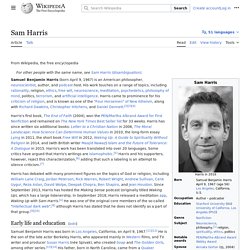
His work touches on a wide range of topics, including rationality, religion, ethics, free will, neuroscience, meditation, psychedelics, philosophy of mind, politics, terrorism, and artificial intelligence. Harris came to prominence for his criticism of religion, and Islam in particular, and is described as one of the "Four Horsemen of the Non-Apocalypse", along with Richard Dawkins, Christopher Hitchens, and Daniel Dennett.[2][3][4]
The Moral Landscape. Challenging the age-old philosophical notion that we can never get an 'ought' from an 'is', Harris argues that moral questions are best pursued using, not just philosophy, but the methods of science.
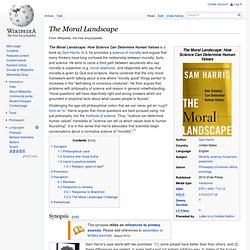
Thus, "science can determine human values" translates to "science can tell us which values lead to human flourishing". It is in this sense that Harris advocates that scientists begin conversations about a normative science of "morality".[1] Synopsis[edit] Harris believes science has already begun to pin-down the causes of human "happiness", and that regulating this pursuit is the purpose of "social morality"[2] Harris attests to the importance of admitting that such facts exist, because he says this logic applies to groups of individuals as well.
Harris then makes a pragmatic case that science could usefully define "morality" according to such facts (about people's wellbeing). Philosophical case[edit] Harris says science requires that one acknowledge certain values (e.g. curiosity) Paulo Coelho. Paulo Coelho (Portuguese: [ˈpawlu kuˈeʎu]; born August 24, 1947), is a Brazilian lyricist and novelist.
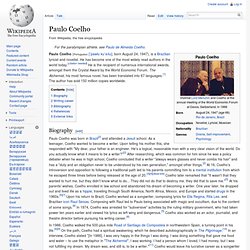
He has become one of the most widely read authors in the world today. [citation needed] He is the recipient of numerous international awards, amongst them the Crystal Award by the World Economic Forum. The Alchemist, his most famous novel, has been translated into 67 languages.[1] The author has sold 150 million copies worldwide. Biography[edit] Paulo Coelho was born in Brazil[2] and attended a Jesuit school.
Writing career[edit] The Alchemist, easily known as his most successful story, is a story about a young shepherd who follows his spiritual journey to the Egyptian pyramids in search of a treasure. The Alchemist (novel) The Alchemist (Portuguese: O Alquimista) is a novel by Paulo Coelho first published in the year 1988.
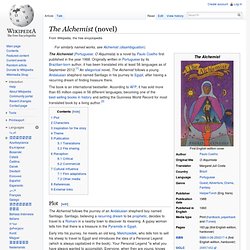
Originally written in Portuguese by its Brazilian-born author, it has been translated into at least 56 languages as of September 2012.[1] An allegorical novel, The Alchemist follows a young Andalusian shepherd named Santiago in his journey to Egypt, after having a recurring dream of finding treasure there. The book is an international bestseller. According to AFP, it has sold more than 65 million copies in 56 different languages, becoming one of the best-selling books in history and setting the Guinness World Record for most translated book by a living author.[2] The Alchemist follows the journey of an Andalusian shepherd boy named Santiago. Santiago, believing a recurring dream to be prophetic, decides to travel to a Romani in a nearby town to discover its meaning.
Along the way, he meets an Englishman and continues his travel with him. The novel was not an instant bestseller. Frédéric Beigbeder. Frédéric Beigbeder, Cracow (Poland), 23 October 2004 Biography[edit] Beigbeder was born into a privileged family in Neuilly-sur-Seine, Hauts-de-Seine.
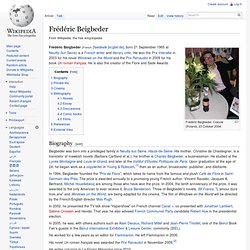
His mother, Christine de Chasteigner, is a translator of mawkish novels (Barbara Cartland et al.); his brother is Charles Beigbeder, a businessman. He studied at the Lycée Montaigne and Louis-le-Grand, and later at the Institut d'Etudes Politiques de Paris. Upon graduation at the age of 24, he began work as a copywriter in Young & Rubicam,[1] then as an author, broadcaster, publisher, and dilettante. In 2002, he presented the TV talk show "Hypershow" on French channel Canal +, co-presented with Jonathan Lambert, Sabine Crossen and Henda. 99 francs.